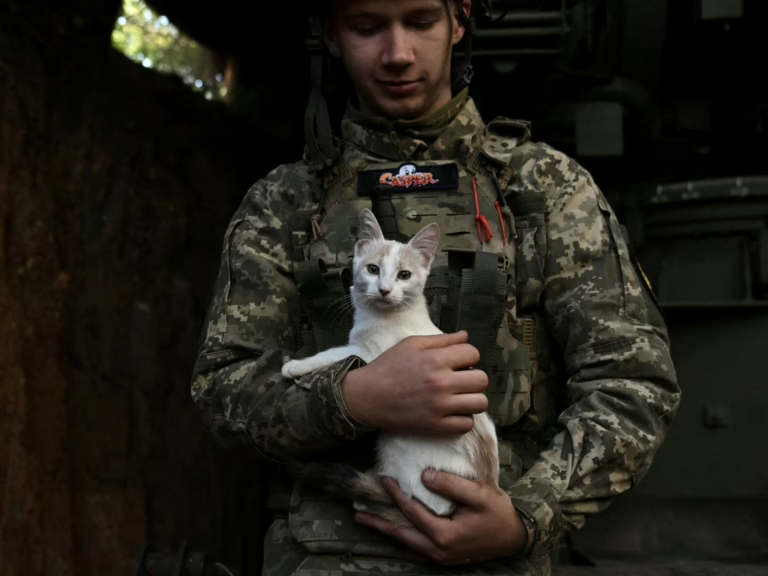Kyiv, Ukraine – Former U.S. President Donald Trump has recently altered his stance on the conflict between Russia and Ukraine, suggesting that Kyiv has the potential to reclaim its lost territories.
In a notable shift on Tuesday, Trump expressed optimism that Ukraine could recover the approximately 20% of its land seized by Russia since the 2014 annexation of Crimea, the Kremlin’s backing of separatist forces, and the full-scale invasion launched in 2022.
“With the backing of the European Union, Ukraine is capable of fighting to regain all of its original territory,” Trump declared on his Truth Social platform.
Despite this declaration, experts in politics and military strategy remain doubtful about the sincerity and feasibility of his statement.
Volodymyr Fesenko, director of the Kyiv-based Penta think tank, emphasized that Trump’s remarks should not be interpreted as a definitive policy reversal.
“Trump’s comments are more of a rhetorical gesture expressing support and goodwill towards Ukraine rather than a concrete commitment to restoring the 1991 borders,” Fesenko explained to Al Jazeera.
He added, “These statements serve as a form of pressure on Russian President Vladimir Putin but do not indicate any groundbreaking or decisive actions forthcoming.”
Trump has consistently maintained that the responsibility for aiding Ukraine in reclaiming its territories lies primarily with NATO and the European Union, rather than the United States alone.
“Viewing the situation through a business lens, Trump recognizes the deteriorating state of Russia’s economy,” Fesenko noted.
Western sanctions, coupled with sluggish economic growth, rising inflation, budget shortfalls, and increased interest rates, have collectively weakened Russia’s financial stability this year, dampening the economic momentum fueled by the war.
“Trump’s priority is ending the conflict rather than ensuring a Ukrainian victory,” Fesenko said. “His objectives remain unchanged, which is why he continues to send nuanced signals to Putin.”
In reaction to Trump’s recent comments, the Kremlin dismissed them as “incorrect” and reiterated its commitment to continuing the military campaign.
Fesenko pointed out the ongoing tug-of-war over Trump’s position, referencing the August 15 summit in Alaska between Trump and Putin, which partially eased Russia’s diplomatic isolation but failed to produce any tangible benefits for Ukraine.
Trump is advocating for the European Union to intensify economic sanctions against Russia, with the possibility of the U.S. aligning its efforts with Brussels in the future through coordinated sanctions and increased military assistance.
“While Trump may not fully align with our interests, his indirect support is still valuable,” Fesenko concluded.
Ukrainian analysts argue that for Trump’s support to be truly effective, a shift in his approach is necessary.
“He should focus more on concrete actions rather than rhetoric,” stated Lieutenant General Ihor Romanenko, former deputy chief of Ukraine’s General Staff, in an interview with Al Jazeera.
Romanenko suggested that Trump’s recent statements likely reflect the influence of advisors from the Pentagon, intelligence agencies, or certain members of Congress rather than his personal judgment.
To maximize the impact of Western aid, Kyiv must undertake significant internal reforms, Romanenko emphasized.
These include comprehensive mobilization of all eligible men, transitioning the economy to a wartime footing, and enforcing martial law more rigorously, potentially with stricter penalties for draft evasion and corruption.
However, such measures face resistance, as recent mobilization efforts have been met with criticism.
‘Returning to 1991 Borders Remains Unthinkable’
Meanwhile, Russia’s summer military campaign is approaching its conclusion.
“Although Russia has not fully achieved its objectives, it still retains considerable resources and continues to make advances,” Romanenko observed.
Earlier this year, President Putin claimed that the offensive would decisively weaken Ukrainian forces and resistance.
Russia has secured full control over Luhansk, the smallest region under its occupation, and is pressing forward into the larger Donetsk region, targeting several strategic urban centers.
“Progress will be gradual, as Russian forces are not as strong as before,” Romanenko added.
During the summer, Russian troops captured roughly 2,000 square kilometers, establishing a foundation for further operations in the coming autumn and winter seasons.
They have approached key defensive positions in Donetsk, moved into the Dnipro area, and advanced in southern Zaporizhia, delineating the main zones of conflict for the near future, according to Nikolay Mitrokhin from Bremen University in Germany.
Mitrokhin stressed Ukraine’s urgent need for advanced U.S.-supplied weaponry, including HIMARS precision rocket systems, armored vehicles, and Patriot missile defense batteries, to safeguard cities and counter Russian aircraft deploying heavy glide bombs.
He also highlighted the importance of acquiring additional F-16 fighter jets-even older, retired models-to combat Russian drones and missile threats, alongside 100,000 all-terrain vehicles for frontline mobility.
Nonetheless, Mitrokhin asserted that even with such support, the prospect of Ukraine regaining its 1991 borders is unrealistic.
The widespread use of drones has rendered large-scale armored assaults ineffective for reclaiming territory.
Another challenge lies in the limited tactical proficiency of Ukrainian senior commanders, who reportedly exhibit insufficient accountability for lost equipment and personnel.
He cited the costly failures of Kyiv’s counteroffensives in late 2022 and 2023, which resulted in significant casualties and depletion of Western-supplied arms.
Ukrainian forces have demonstrated success primarily in localized operations during moments when Russian forces are less vigilant, such as the liberation of Izium in 2022 and a surprise advance into Russia’s Kursk region in 2024.
Operations in areas with minimal Russian troop presence, like the strategically vital Kinburn Peninsula in Kherson where the Dnipro River meets the Black Sea, have also seen progress.
Given these realities, Mitrokhin concluded that even recovering territories lost after 2022 remains a distant goal.

















